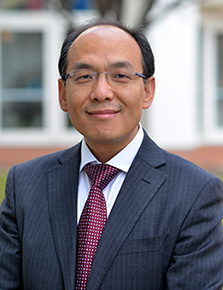 |
The University of Maryland (UMD) has been awarded $5 million in funding to lead a national Center for Transportation Excellence that will help foster innovative avenues for financing highway projects, including through public-private partnerships (P3).
Four universities—Virginia Tech, Georgia Tech, Purdue, and Stanford—will serve as regional leads for the new center, with UMD as national lead. Known as the Build America Center, it will support the Federal Highway Administration (FHWA) and the Build America Bureau as they seek to foster new approaches to financing the construction and maintenance of the nation’s roadways.
"Building a transportation infrastructure system that meets our future needs is a critical priority, and engineers are positioned to help address this challenge," said Maryland Engineering’s Dean Samuel Graham, Jr. "At Maryland Engineering, our students and faculty have the creativity and ingenuity to support our federal, state, and local decision-makers in planning and building an infrastructure system that's sustainable and one that meets the needs of our society for years to come. We're grateful to the U.S. Department of Transportation for this opportunity to collaborate, and look forward to the innovations this partnership will bring."
Sam Beydoun, project management lead for the Build America Bureau, highlighted the advantages that UMD brings to the collaboration.
“As a research institution that has great expertise in education, UMD is in a strong position to support what we do at the Bureau in terms of educating project sponsors, state DOTs and local governments about the benefits of alternative project delivery and innovative financing,” Beydoun said. “In partnership with the Center’s regional leaders, UMD will provide tools and resources that can help stakeholders deliver better projects.”
 UMD civil and environmental engineering professor Qingbin Cui, an expert in transportation engineering and highway financing, will lead the endeavor, which also leverages UMD resources such as the Maryland Transportation Institute (MTI), the Center for Advanced Transportation Technology (CATT), the Center for Advanced Transportation Technology Lab (CATT Lab), and the Project Management Center of Excellence. UMD civil and environmental engineering professor Qingbin Cui, an expert in transportation engineering and highway financing, will lead the endeavor, which also leverages UMD resources such as the Maryland Transportation Institute (MTI), the Center for Advanced Transportation Technology (CATT), the Center for Advanced Transportation Technology Lab (CATT Lab), and the Project Management Center of Excellence.
“We are helping the FHWA and the Build America Bureau to perform cutting-edge research related to innovative financing, project delivery, and policies, as well as providing training and professional educational services to state and local transportation agencies,” Cui said.
The need for such resources, already strong, has ramped up further because of the $1.2 trillion Bipartisan Infrastructure Law passed by Congress in late 2021. Among its many other provisions, the law requires states to make greater use of innovative financing as they carry out highway and infrastructure projects.
“In leading the Center, UMD is providing important support for this legislation,” Cui said. “We can assist states in implementing its provisions.”
Historically, states have relied on taxation to build infrastructure, but that approach has become less sustainable as costs mount. Alternatives include P3, in which a state or local government contracts with a private company in order to carry out a project, as well as the use of toll revenues and financing instruments such as Private Activity Bonds. The Build America Bureau, founded in 2015 as part of the Fixing America’s Surface Transportation (FAST) Act, helps provide stakeholders with access to discounted financing, including through credit programs and grants, that can be used to fund projects with less reliance on taxes.
The Bureau also organizes workshops, webinars, training programs, and other forms of technical assistance, many of which will now be supported by the UMD-led Center.
Funding for P3 and other alternative financing-based projects often flows to smaller agencies that may not have sufficient experience and knowhow, thus making such assistance crucial, said Patrick DeCorla-Souza, P3 Program Manager at the Bureau and at FHWA’s Center for Innovative Finance. “Our hope is that, through this Center, we can provide a way for these smaller agencies to get the help that they need, as well as benefitting states that have not used federal financing in the past.”
“For those that are unfamiliar with the process, it can seem complex. We hope, through the Center’s activities, to make it clearer to them,” DeCorla-Souza said.
Related Articles:
Highway Project Database Provides “One-Stop Shop”
April 8, 2022
|

